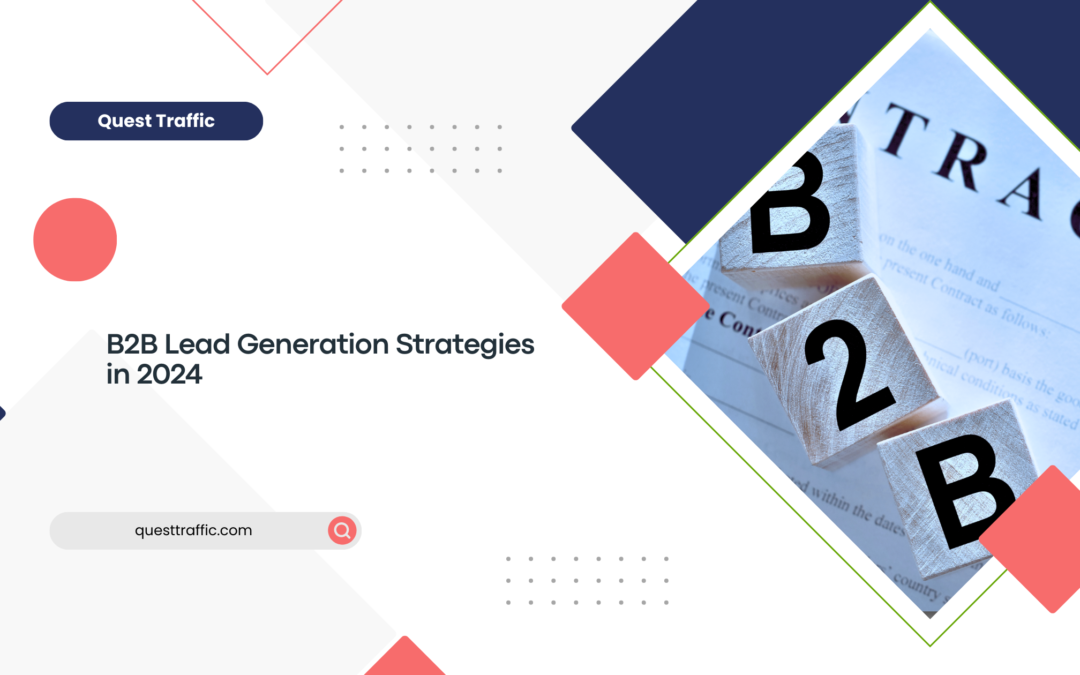
Powerful B2B Lead Generation Strategies that Can Help Businesses Grow
Define Your Target Audience
Before diving into lead generation tactics, it’s essential to clearly define your target audience. Understanding your ideal customer profile enables you to create tailored strategies that resonate with their needs and pain points. Conduct thorough market research, analyze demographic data, and segment your audience based on industry, company size, job titles, and other relevant criteria.
Content Marketing and Thought Leadership
Content marketing plays a vital role in B2B lead generation. By creating valuable and informative content, you position your brand as a thought leader in your industry. Develop a content strategy that includes blog posts, whitepapers, case studies, and industry reports. Optimize your content with relevant keywords and share it across various channels to increase visibility and attract your target audience.
Lead Magnets and Gated Content
Offering lead magnets and gated content is an effective way to capture valuable information from your prospects. Create compelling e-books, guides, checklists, or webinars that provide valuable insights and solutions to your target audience’s pain points. In exchange for this valuable content, ask users to provide their contact information, such as name, email address, and company details.
Email Marketing and Nurturing Campaigns
Email marketing remains one of the most effective B2B lead generation strategies. Build an email list of prospects and send targeted, personalized emails that nurture relationships and move leads through the sales funnel. Use marketing automation tools to streamline your email campaigns, send personalized content based on user behavior, and track email engagement metrics.
Social Media Advertising and Retargeting
Leverage social media platforms like LinkedIn, Facebook, and Twitter to reach your B2B audience effectively. Create targeted advertising campaigns that showcase your brand, products, and value proposition. Use audience targeting options to reach decision-makers and influencers in specific industries. Additionally, implement retargeting campaigns to stay top-of-mind with users who have shown interest in your products or services.
Webinars and Virtual Events
Hosting webinars and virtual events can be highly effective in generating B2B leads to Grow Businesses. Choose topics that are relevant to your target audience and offer valuable insights and actionable strategies. Promote your webinars through various channels, including email marketing, social media, and website banners. Capture leads by requiring registration before attending the webinar and follow up with attendees afterward.
Strategic Partnerships and Referral Programs
Establishing strategic partnerships with complementary businesses can expand your reach and generate quality B2B leads. Identify companies that share a similar target audience but offer non-competing products or services. Explore opportunities for co-marketing campaigns, joint webinars, or referral programs, where you mutually promote each other’s offerings and generate leads together.
Conclusion
Implementing effective B2B lead generation strategies is essential for sustainable business growth and success. By understanding your target audience, creating valuable content, leveraging email marketing, social media advertising, webinars, and strategic partnerships, you can attract high-quality leads and nurture them into long-term customers. Stay proactive, adapt to market trends, and continuously optimize your lead generation efforts to stay ahead of the competition and drive revenue for your B2B business.
Frequently Asked Questions
Q1: What is B2B lead generation? A1: B2B lead generation refers to the process of attracting and capturing potential business customers (leads) who have shown interest in a product or service offered by a business. It involves various strategies and tactics aimed at identifying and nurturing prospects through the sales funnel.
Q2: Why is lead generation important in the B2B context? A2: Lead generation is vital for B2B businesses as it helps in acquiring new customers, increasing sales revenue, and driving business growth. It allows companies to build a pipeline of qualified leads, enabling them to focus their marketing and sales efforts on prospects who are more likely to convert into paying customers.
Q3: What are some effective B2B lead generation strategies? A3: There are several effective B2B lead generation strategies, including content marketing, email marketing, social media advertising, webinars, lead magnets, thought leadership, strategic partnerships, and referral programs. These strategies help attract, engage, and convert potential customers into leads.
Q4: How can content marketing contribute to B2B lead generation? A4: Content marketing plays a crucial role in B2B lead generation by providing valuable and informative content to the target audience. It establishes the brand as a thought leader, attracts organic traffic through search engines, and helps nurture prospects through the sales funnel by offering relevant content at each stage.
Q5: What are lead magnets and gated content? A5: Lead magnets are valuable resources such as e-books, guides, checklists, or webinars that businesses offer in exchange for a prospect’s contact information. Gated content refers to content that is accessible only after the user provides their details, enabling businesses to capture leads and continue nurturing them.
Q6: How does email marketing contribute to B2B lead generation? A6: Email marketing allows businesses to nurture leads by sending targeted, personalized emails. It helps build relationships, educate prospects about products or services, and guide them through the sales funnel. Email marketing automation tools can streamline campaigns, track engagement, and improve conversion rates.
Q7: Can social media advertising be effective for B2B lead generation? A7: Yes, social media advertising can be highly effective for B2B lead generation. Platforms like LinkedIn, Facebook, and Twitter offer sophisticated targeting options to reach specific B2B audiences. By creating targeted ad campaigns and retargeting website visitors, businesses can generate quality leads through social media channels.
Q8: How do webinars contribute to B2B lead generation? A8: Webinars provide an opportunity to engage prospects through live or recorded online events. By offering valuable insights and actionable strategies, businesses can attract interested attendees who willingly provide their contact information. Webinars help in building trust, showcasing expertise, and nurturing leads.
Q9: Are strategic partnerships and referral programs beneficial for B2B lead generation? A9: Yes, strategic partnerships and referral programs can significantly contribute to B2B lead generation. By collaborating with complementary businesses, sharing resources, and mutually promoting each other’s offerings, companies can expand their reach, tap into new audiences, and generate high-quality leads through referrals.
Q10: How important is optimization in B2B lead generation? A10: Optimization is critical in B2B lead generation as it helps businesses improve the effectiveness of their strategies. By analyzing data, tracking metrics, and making data-driven decisions, companies can optimize their lead generation efforts, refine their targeting, and maximize conversions, resulting in better ROI.
A Seasoned SEO professional with a proven track record in boosting online visibility and driving organic traffic. Skilled in keyword research, on-page optimization, and technical SEO, dedicated to delivering data-driven strategies that enhance search engine rankings and improve ROI.


